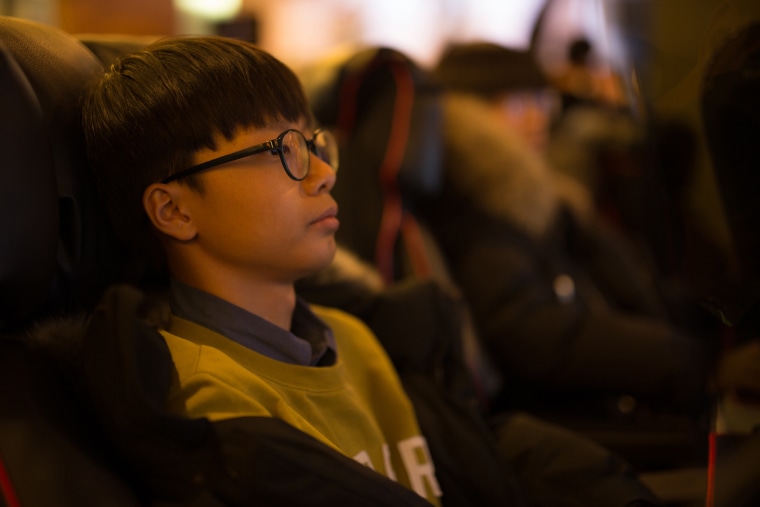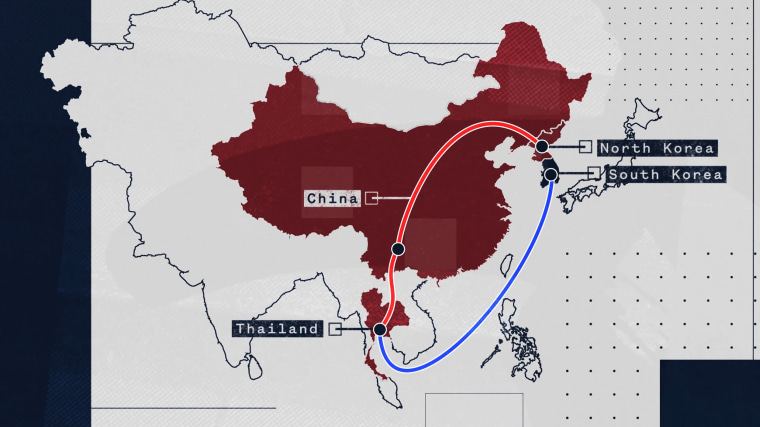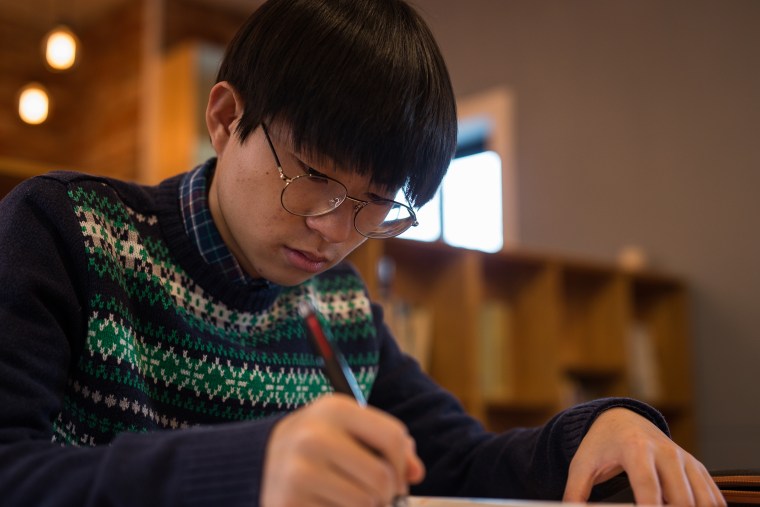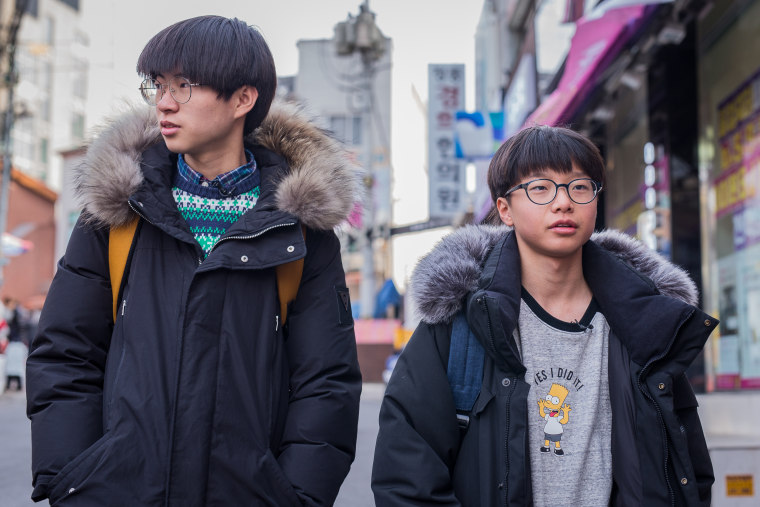SEOUL, South Korea — Five years ago, as young boys, they crossed a frozen river in the dark of winter. As they passed from North Korea into China, they didn't yet understand that they were leaving their homes for good.
More than 6,000 miles later, Park Kwon's and Ju Cheol Kwang's separate trek to freedom brought them to South Korea, where they met as roommates in a group home for other young North Korean defectors. The friends, now 16, have worked hard to adjust to their new lives in Seoul. They spend their days studying, and downtime playing video games at "PC bangs" — internet cafés that cost $1 an hour and serve steaming bowls of ramen.
"It is more comfortable [in South Korea]," Cheol Kwang said through a translator, "but sometimes I think of my hometown. That can be difficult."
Their childhoods have been on their minds lately, with the announcement earlier this month of unprecedented summits between North and South Korean leaders and President Donald Trump that could happen this spring. For the teenagers, the talks raise long-buried hopes of someday being reunited with their families — but the negotiations are also an overwhelming reminder of just how much they've given up for the freedom of being in the South.
Kwon and Cheol Kwang remind themselves that they are lucky to have made it safely to Seoul; the number of North Korean escapees to South Korea fell last year to its lowest level since 2001, amid heightened tensions and threats on the Korean Peninsula. But the teens, like other recent defectors, are also facing a more difficult reality than those who arrived to the South even one or two decades earlier.
They must contend with rapidly evolving technology and a highly competitive labor market that requires them to match their peers in one of the most wired countries on the planet.
"South Korea is a completely different society," said Ji Cheol-ho, a 32-year-old North Korean defector who helps to run Now Action and Unity for Human Rights, a group in Seoul that raises awareness about human rights abuses in North Korea. "If you don't study, you won't understand this society, and if you don’t understand South Korean society, you'll never become part of it."
Making their escape
Cheol Kwang and Kwon look like brothers, with their matching bowl haircuts, glasses and puffy black jackets that fill out their slight frames. But what binds them in a deeper way are their stories.
Cheol Kwang spent his childhood in North Korea laboring in the fields of Ryanggang Province to help support his family. He didn't go to school, and learned from his family at a young age that he must revere the Kim regime. He ate one or two meals a day, typically roasted corn or potatoes with rice.
His father died when he was 8. Four years later, in 2013, he and an older sister were told by their mother that they had to leave North Korea. He doesn't remember much of the odyssey and is careful to protect the details of his family and escape, but he said he crossed into China on a frozen river. He stayed for about two weeks before being smuggled into Laos and was then granted safe passage into South Korea.
As required of all defectors, even children, he spent three months at a resettlement center outside of Seoul that teaches basics about South Korea and its history, as well as how to use its currency and transportation. The center also provides medical treatment and psychological counseling. He was then sent to the group home where he met Kwon in June 2014.

It felt like a dream. "The quality of food, clothing and shelter is so good. It's the complete opposite of North Korea in that way, which was a pleasant surprise," Cheol Kwang said.
Kwon's path to the South started from the mountainous mining region of North Hamgyong Province.
In the winter of 2013, when he was 11, his family told him he would be going to his cousins' home nearby. He was dressed in a thick coat. He saw his parents for what he didn’t know was the final time.
With his older cousins, he snuck into China on the narrow Tumen River at night. After crossing a shallow, frozen stretch, the lights of distant buildings guided him and his cousins like a North Star.
"It was so bright," Kwon said. "That left a deep impression on me."
After a month in China, he was smuggled to Thailand, where police detained him. When they asked where he wanted to go, he gave only one answer: South Korea.
Cheol Kwang's and Kwon's circuitous path to South Korea is common among defectors. It's nearly impossible to cross directly from North to South through the heavily fortified Demilitarized Zone, so defectors generally pass through the porous border with eastern China, which sometimes requires a bribe to a North Korean soldier.

From North Korea, defectors might pay upwards of $10,000 to a smuggler to get into China and then thousands more to enter a Southeast Asian country, such as Thailand or Laos, defector activist groups say. Then they willingly get detained by authorities who will contact the South Korean embassy.
South Korea's constitution recognizes all Koreans as citizens. The country has accepted more than 31,000 North Korean defectors, including about 4,500 children, since the peak of a crippling famine in 1998.
Ki-won Chun, a pastor whose faith-based Durihana Mission has rescued more than 1,100 North Korean refugees from China since 1999, said defectors fear getting caught there. The Chinese government sends defectors back to North Korea, where they are often imprisoned or tortured in political camps as traitors, according to the Human Rights Watch.
Chun's group didn't aid Kwon or Cheol Kwang, but the pastor said he's seen many families split up so children can escape, sometimes alone.
"It can only be difficult for these children," Chun said, "because they were born into a completely different culture."
Starting over in the South
When Cheol Kwang and Kwon arrived in South Korea, one of their first challenges was to reconcile what they had been taught with what was actually true.
Cheol Kwang was amazed to see most people in the South had cars, carried cellphones and lived in tall, modern buildings with electricity that didn't flicker out in a storm. On television, the choice of channels was endless. In North Korea, there was only one — and it showed state propaganda.
In the group home they share in suburban Seoul, Cheol Kwang and Kwon live with several other boys and their guardian, Kim Tae-ho, whom they call "uncle." Kim makes sure they have three meals a day, go to school and take their education seriously.
It's adapting to school that has been difficult.

"We have three special school subjects in North Korea. They are Kim Jong Un, Kim Jong Il and Kim Il Sung," Kwon said of the autocratic country's founding family. "Because South Korea doesn't have those classes, I thought it'd be easier. But what a North Korean sixth-grader learned in math or languages is the equivalent for a South Korean fourth-grader."
Kwon's transition has left him a grade behind. While he likes science, staying focused can be difficult.
"My teachers and tutors have been saying, 'Now is the time you have to really start studying,'" he said.
Cheol Kwang, who never had proper schooling, only learned how to read and write once he got to South Korea.
Advancing in the South requires determination in a society where a teen's education weighs heavily in getting accepted to a top college, said Ahlam Lee, an Xavier University professor who has written about North Korean defectors. Refugees "typically face prejudice and discrimination," Lee said, which is compounded by the trauma from their past.
Young North Korean defectors say they worry about transitioning into regular schools and hear rumors of bullying by South Koreans.
Cheol Kwang and Kwon said they haven't faced discrimination from their peers. They've made South Korean friends who know that they're from the North and accept them.
They also meet regularly with English-speaking exchange students from Europe attending Korea University. Sometimes they go bowling together or hang out at PC bangs, and some of the exchange students joined the group home for Christmas dinner last year.
One of the students, Jasmin Vogel, a 21-year-old from Switzerland, said she admires how the young defectors have become a makeshift family. They protect one another and support even the smallest triumphs.
"One time, one boy came in and said, 'I got a love note!'" Vogel said.
The teens simply want to "be normal," she added, after enduring hardships that are far removed from their current lives.
"They're like other young men and boys who are trying to find their place in the world," Vogel said.
Now, when the teens look to the future, they see opportunities that once were closed off.
Kwon's love of science has him thinking of a career in astronomy, while Cheol Kwang would like to practice medicine and become a doctor — dreams they wouldn't have had in North Korea.
But they still yearn for what they've left behind. Kwon said he's hopeful that he will see his family again someday, after five years without even a message.
"North-South relations have been tense," Kwon said. "But if both sides worked together so that we could visit each other, I'd look first for my parents and pay them a visit."
He would tell them where he's been, he said, and how much farther he has to go.



